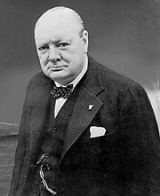
British politician and statesman
known for his leadership of the United Kingdom during the Second World War
. He is widely regarded as one of the greatest wartime leaders of the century and served as Prime Minister
twice (1940–45 and 1951–55). A noted statesman and orator, Churchill was also an officer
in the British Army, a historian, a writer, and an artist.
1874 Winston Churchill is born at Blenheim Palace in Oxfordshire, Great Britain.
1901 Winston Churchill makes his maiden speech in the House of Commons.
1906 Sir Henry Campbell-Bannerman's cabinet (which included amongst its members H. H. Asquith, David Lloyd George, and Winston Churchill) embarks on sweeping social reforms after a Liberal landslide in the British general election.
1911 Churchill is elected First Lord of the Admiralty for the first time.
1940 World War II: Winston Churchill is appointed Prime Minister of the United Kingdom.
1940 World War II: Germany's conquest of France begins as the German army crosses the Meuse. Winston Churchill makes his "blood, toil, tears, and sweat" speech to the House of Commons.
1940 "Finest Hour" speech by Winston Churchill.
1943 World War II: Franklin D. Roosevelt and Winston Churchill begin the Casablanca Conference to discuss strategy and study the next phase of the war.
1943 World War II: Franklin D. Roosevelt becomes the first President of the United States to travel via airplane while in office when he travels from Miami, Florida to Morocco to meet with Winston Churchill.
1943 World War II: Franklin D. Roosevelt and Winston Churchill conclude a conference in Casablanca.
She shone for me like the Evening Star. I loved her dearly — but at a distance.![]()
Where my reason, imagination or interest were not engaged, I would not or I could not learn.![]()
Thus I got into my bones the essential structure of the ordinary British sentence, which is a noble thing.![]()
Headmasters have powers at their disposal with which Prime Ministers have never yet been invested.![]()
I then had one of the three or four long intimate conversations with him which are all I can boast.![]()
Although always prepared for martyrdom, I preferred that it should be postponed.![]()
You will make all kinds of mistakes; but as long as you are generous and true, and also fierce, you cannot hurt the world or even seriously distress her.![]()
I wonder whether any other generation has seen such astounding revolutions of data and values as those through which we have lived. Scarcely anything material or established which I was brought up to believe was permanent and vital, has lasted. Everything I was sure or taught to be sure was impossible, has happened.![]()

